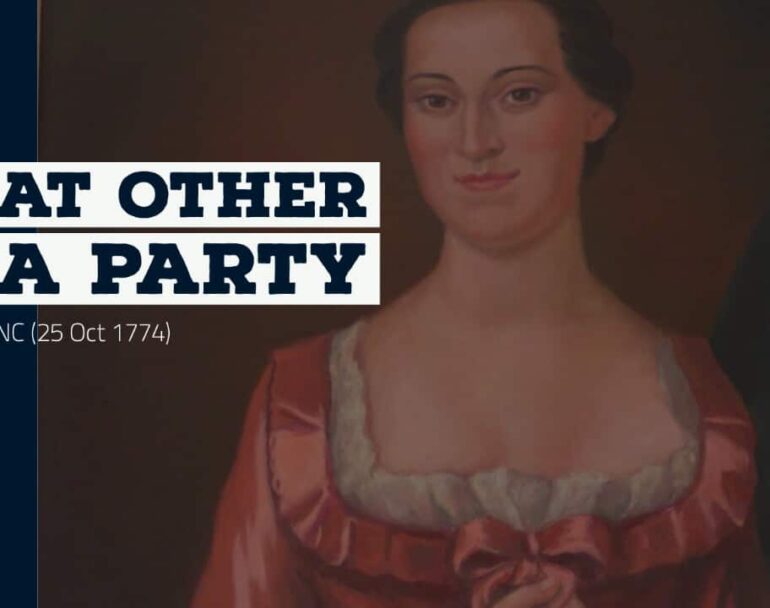Many Americans have heard of the Boston Tea Party of 1773. Far less can tell of the Edenton Tea Party of 1774. I can count a few, but I have some fingers left.
During the Revolution era, Edenton, North Carolina was a hotbed of political debate. After approximately fifty men, dressed like Indians, boarded three ships on December 16, 1773, and dumped tea in the Boston, Massachusetts harbor to protest imposing trade legislation, many North Carolinians approved. In 1774, the North Carolina province passed non-importation resolves to protest British trade regulation. That year at tea parties, a fashionable form of entertainment, polemics and ardent gesturing no doubt heated the rooms and hallways of Edenton. Soon, an unforeseen defense of liberty occurred there.
It is unknown whether the Edenton Tea Party was planned. What is known is that Penelope Barker, the dynamic wife of Thomas Barker, Treasurer of the Province of North Carolina, organized a seemingly innocuous tea party. But, I think she was the brilliant mastermind of what happened there on October 25, 1774.
With aplomb, Barker probably convinced forty-seven to fifty-one women to stop drinking tea and buying English clothes and to sign the following petition:
“The Provincial Deputies of North Carolina, having resolved not to drink any more tea, nor wear any more British cloth, many ladies of this province have determined to give memorable proof of their patriotism, and have accordingly entered into the following honourable and spirited association. I send it to you to shew your fair countrywomen, how zealously and faithfully, American ladies follow the laudable example of their husbands, and what opposition your matchless Ministers may expect to receive from a people thus firmly united against them.”
The petition continued: “We cannot be indifferent on any occasion that appears nearly to affect the peace and happiness of our country, and . . . it is a duty which we owe, not only to our near and dear connections, . . . but to ourselves. . . .”
The petition shocked the British and loyal colonists. London magazines labeled the Edenton women uncontrollable, and mezzotint caricatures abounded. While visiting London, North Carolina Royalist Arthur Iredell was vexed after hearing the news of the tea party. In a letter to his brother James, he sardonically asked: “Pray are you becoming patriotic? . . . . Is there a Female Congress at Edenton, too?”
Truth is many times disguised as humor, as evidenced by the rest of Iredell’s letter: “If the Ladies, who have ever, since the Amazonian Era, been esteem[e]d the most formidable Enemies, if they, I say, should attack us, the most fatal consequence is to be dreaded. So dextrous in the handling of a dart, each wound they give is mortal . . . The more we try to conquer them, the more we are conquered.”
Although there was no dumping of tea into the ocean, the petition penned at the Edenton Tea Party was nothing less than a bold display of patriotism and love of liberty.
During the early 1770s, Whiggish men (those who supported the colonies) frequently blamed their spouses, mother, sisters, and daughters for preventing the creation of a distinct American culture. They would rather annul an American boycott, the story goes, than divorce English tea or clothes. The Edenton Tea Party petition proved otherwise, for the Edenton women boycotted English goods and alerted King George III that they had done so.
The women’s action was also a political first. Before the 1770s, women did not sign petitions. But in Edenton, politically aware women expressed publicly not only a love for their families but also for liberty and for country. Penelope Barker most likely reminded them that they played an integral part of any attempt to create a virtuous republic.
Protecting liberty requires persistent boldness, and from time to time, the unexpected. Sometimes an intrepid individual, such as Penelope Barker, needs to inspire the listless and timid among us to steadfastly defend our liberties.
